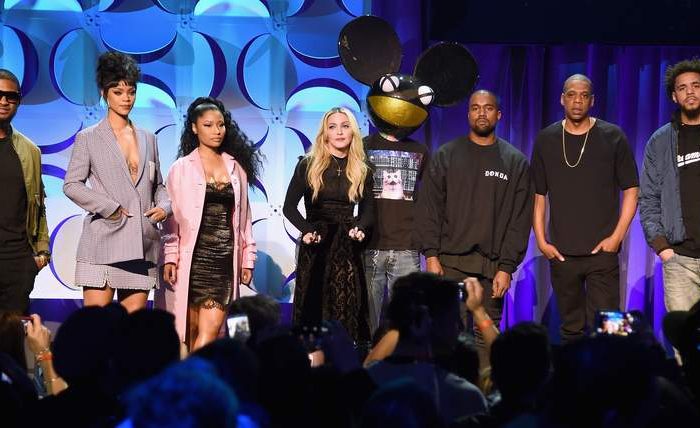


The star’s new venture is not about those listening to music, but those making a lot of money from it, writes Sky’s Tom Cheshire.
“Our intent is to preserve music’s importance in our lives,” proclaimed Alicia Keys on stage at the relaunch of Tidal, a streaming music service recently bought by Jay Z for $56m.
Keys was standing there not as an artist, but as an “owner” – along with other megastars like Daft Punk, Beyoncé, Calvin Harris, Rihanna and Kanye West.
Who does she mean by “our lives”?
Probably not us.
We have never been able to listen to more music, whether it is on Spotify, iTunes, YouTube, to new music on Soundcloud and mixtapes on Mixcloud; browsing in real life in however many HMVs are still knocking about, or buying vinyl in independent record stores.
Sales of vinyl hit 9.2 million in 2014, the highest figure in more than two decades.
Before the relaunch, big selling artists changed their avatars to a tasteful light blue and tweeted #TIDALforALL, encouraging their followers to do the same: an advert disguised as social activism.
Tidal is not for all.
It is not about those listening to the music – it is about those making it. Specifically, those already making a lot of money from it.
Tidal is charging £9.99 a month for a basic subscription, and £19.99 for a high-quality audio subscription.
There is no free version.
This is not a mass market proposition, unless Tidal really believes people are willing to pay more for their music so that Deadmau5 can be a bit richer.
Keys pitched the service as “the first artist-owned global music and entertainment platform”.
Artists are being offered equity in return for exclusive album launches and the like.
It is clear that this does not mean much for emerging musicians, whose exclusivity will not be worth much equity.
That is not a bad idea.
Many artists feel that streaming gives them a raw deal. Spotify pays less than a penny per stream of a song.
Taylor Swift removed her entire back catalogue from Spotify last year.
The chief result was a huge amount of publicity for the Swedish tech company.
The problem is that Tidal, as it is presented right now, will not be able to compete with Spotify, which itself is going to be enjoying life a little bit less with YouTube and Apple’s new music streaming services.
Spotify finds it hard enough to convert its free users into paying, although it has improved its ratio: 45 million listen for free and 15 million pay.
As a result, Spotify says it paid $1bn to the music industry in 2014.
Taylor Swift told the Wall Street Journal last year: “Music is art, and art is important and rare.
“Important, rare things are valuable. Valuable things should be paid for.”
Music online is not rare at all, but it is valuable.
Spotify and other streaming services like Pandora are trying to unlock that value for the industry, from up and coming artists to megastars – and of course themselves as businesses.
At the same time, their free versions have helped reduce online music piracy to its lowest level in years.
Tidal is not an attempt to displace Spotify, or YouTube or Apple.
As Jay Z told Billboard, addressing Apple’s Beats service: “I don’t have to lose in order for you guys to win and let’s just remember that.”
Tidal’s superstars know that their music in particular is valuable, and are simply trying to carve out a little bit more of that value for themselves. SkyNews